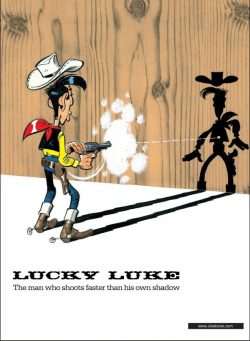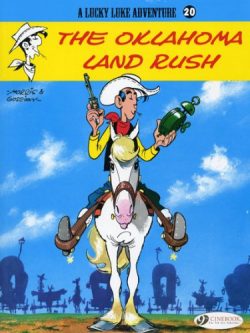

By Morris & Goscinny, translated by Luke Spear (Cinebook)
ISBN: 978-1-84918-008-5 (PB Album/Digital edition)
Doughty, dashing and dependable cowboy champion Lucky Luke is a rangy, implacably even-tempered do-gooder able to “draw faster than his own shadowâ€. He amiably ambles across the fabulously mythic Old West, enjoying light-hearted adventures on his rather sarcastic wonder-horse Jolly Jumper. The taciturn trailblazer regularly interacts with a host of historical and legendary figures as well as even odder folk in tales drawn from key themes of classic cowboy films – as well as some uniquely European notions, and interpretations…
Over 8 decades, his exploits have made him one of the top-ranking comic characters in the world, generating upwards of 85 individual albums with sales totalling in excess of 300 million in 30 languages thus far. That renown has led to a mountain of spin-off albums, plus toys, computer games, animated cartoons, a plethora of TV shows and live-action movies and even commemorative exhibitions. No theme park yet, but you never know… when…?
The brainchild of Belgian animator, illustrator and cartoonist Maurice de Bévère (“Morrisâ€) and first officially seen in Le Journal de Spirou‘s seasonal Annual L’Almanach Spirou 1947, Luke sprang to laconic life in 1946, before inevitably ambling into his first weekly adventure ‘Arizona 1880’ on December 7th 1946.
Working solo until 1955, Morris produced nine albums of affectionate sagebrush spoofery before teaming with old pal and fellow trans-American tourist Rene Goscinny. When Rene became his regular wordsmith, Luke attained dizzying, legendary, heights starting with Des rails sur la Prairie (Rails on the Prairie) which began serialisation on August 25th 1955. In 1967, the six-gun straight-shooter switched sides, joining Goscinny’s own magazine Pilote for La Diligence (The Stagecoach).
Goscinny co-created 45 albums with Morris before his untimely death, whence Morris soldiered on both singly and with other collaborators. The artist died in 2001, having drawn fully 70 adventures, plus numerous sidebar sagebrush sagas crafted with Achdé, Laurent Gerra, Benacquista & Pennac, Xavier Fauche, Jean Léturgie, Jacques Pessis and others, all taking their own shot at the venerable vigilante…
Lucky Luke has history in Britain too, having first pseudonymously amused and enthralled young readers during the late 1950s, syndicated to weekly anthology Film Fun. He later rode back into comics-town in 1967 for comedy paper Giggle, using nom de plume Buck Bingo.
Ruée sur l’Oklahoma was Morris & Goscinny’s 5th collaboration, originally serialised in 1960 before becoming the 14th album release: a wryly satirical romp based on the actual property reallocation event of 1889, and is delivered with only the slightest application of a little extra whimsical imagination to the actual brutal skulduggery and chicanery of history…
In the real world, President Benjamin Harrison signed a proclamation on March 23rd 1889 opening the “Unassigned Lands†of Oklahoma to non-Indian settlers. Citing the 1862 Homestead Act, it promised any white who could stay on and improve a parcel of land for five years would own it free, clear and without cost. It led to a free-for-all scramble on April 22nd year with an estimated 50,000 people looking for a prime location to put down roots…
The comic version begins on the inhospitable plains of the Oklahoma territory where a representative of the American government trades a pile of trinkets and baubles to the resident Cherokee, Creek, Chickasaw, Choctaw and Seminole tribes who were originally dumped there against their collective will by white soldiers.
They are more than happy to leave those dry, dusty, dull, decidedly depressing regions…
In Washington DC, Senators are gloating over opening the region to colonisation, but troubled that all the settlers eager to own their own land and property might one day be accusing them of negligence or worse unless the allocation process is scrupulously fair. Agreeing on a strictly-monitored race as the most transparent method, the statesmen then need to ensure it’s an honest one, and call in American legend Lucky Luke to oversee the process and adjudicate disputes.
Heading westward on Jolly Jumper, the lone rider’s first task is removing the white folk already occupying their own parcels of land before the official start date. Some are there innocently and others have decided to get a head start and secure prime locations, but eventually all are moved back (some into makeshift jails) beyond the notional starting line of the great Oklahoma rush for land…
Backed up by the cavalry and a horde of lawyers Lucky leaves the “Promised Land†clean and clear for the big day, but is kept busy stopping cheating “sooners†from sneaking in early and staking claims illegally: wicked men and enterprising criminals like Beastly Blubber or Coyote Will and his simple stooge Dopey. Their escapades grow increasingly wild as the start day approaches, but Lucky can handle them. What’s more troubling is the ordinary everyday one-upmanship scurrilously employed by the “honest†citizen-contestants: sabotaging each other’s transport, doping their draft animals and worse.
Eventually, the moment comes, cannons boom and the race for space begins…
Humans being what they are, however, every competitor heads for the same few miles of the two million acres (8100 square kilometres) and overnight the mangy metropolis of Boomville springs up. Despite being held until the race was well underway Beastly Blubber, Coyote Will and Dopey are quick to capitalise on the progress and jealous hostility of the settlers, forcing Lucky to step in repeatedly and – ultimately – ban booze and all guns in the city…
Gradually civilisation blossoms and Luke thinks his job is done when the citizens call an election for Mayor. He couldn’t be more wrong, but the plebiscite does signal the end in another painfully ironic and tragically foreboding way…
Employing classic set-piece slapstick and crafty cinematic caricature but layering on an unusually jaundiced – but frighteningly accurate – view of politicians, government and human nature, The Oklahoma Land Rush deftly weaponizes history (Indian displacement, the future Dust Bowl and the billions of barrels of unexploited oil beneath that unhappy soil) to deliver a funny story with plenty of sharp edges and ends, and a sharp twist to keep readers smugly satisfied. Here is another wildly entertaining all-ages confection by unparalleled comics masters, affording an enticing glimpse into a unique genre for today’s readers who might well have missed the romantic allure of an all-pervasive Wild West that never was…
© Dargaud Editeur Paris 1971 by Goscinny & Morris. © Lucky Comics. English translation © 2009 Cinebook Ltd.
